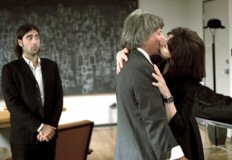I ♥ Huckabees (David O. Russell, 2004)
 I ♥ Huckabees, the exciting
new pseudo-screwball comedy from director David O. Russell, presents a sunny but
trenchant vision of a modern America that’s become a bright purgatory where
gratification stops being gratifying. Ostensibly the story of a case taken on by
a pair of “Existential Detectives”, it is more aptly described as a
communal investigation into the meaning of life when you’re desperately
clinging to some semblance of self in the face of overwhelming stimuli. The film
is modestly noncommittal about its own right to exist. Characters are always
scoffing at the notion that their own search for themselves is a worthwhile
endeavor, but the multitude of perspectives that Russell offers always ensures
there’s someone else ready to question the unanswerable questions. Even in its
third act, where the average film would begin to make its point abundantly
clear, Russell shifts his protagonist yet again to Jude Law’s skeptical
corporate ladder climber (giving this impeccably performed film its best acting
moments), continuing the cycle of questioning. The director is very reticent to dictate to us, probably figuring that
we, like the characters in the film, need to come to whatever eventual revelations
the film holds on our own. There’s an inherently apologetic tone here. Russell
seems to ask for forgiveness for the fact that his script is about people who are
psychologically wounded in this relatively insignificant way when there’s so
much more measurable suffering in the world. The self-doubt isn’t exactly
off-putting, though. It defuses much of the potentially harmful solipsism that
seems inherent in the movie’s premise, and helps to keep the tone buoyant.
Even though I ♥ Huckabees might have more on its mind than any
American film this year, the entire time I watched it, a goofy grin was
plastered on my face.
I ♥ Huckabees, the exciting
new pseudo-screwball comedy from director David O. Russell, presents a sunny but
trenchant vision of a modern America that’s become a bright purgatory where
gratification stops being gratifying. Ostensibly the story of a case taken on by
a pair of “Existential Detectives”, it is more aptly described as a
communal investigation into the meaning of life when you’re desperately
clinging to some semblance of self in the face of overwhelming stimuli. The film
is modestly noncommittal about its own right to exist. Characters are always
scoffing at the notion that their own search for themselves is a worthwhile
endeavor, but the multitude of perspectives that Russell offers always ensures
there’s someone else ready to question the unanswerable questions. Even in its
third act, where the average film would begin to make its point abundantly
clear, Russell shifts his protagonist yet again to Jude Law’s skeptical
corporate ladder climber (giving this impeccably performed film its best acting
moments), continuing the cycle of questioning. The director is very reticent to dictate to us, probably figuring that
we, like the characters in the film, need to come to whatever eventual revelations
the film holds on our own. There’s an inherently apologetic tone here. Russell
seems to ask for forgiveness for the fact that his script is about people who are
psychologically wounded in this relatively insignificant way when there’s so
much more measurable suffering in the world. The self-doubt isn’t exactly
off-putting, though. It defuses much of the potentially harmful solipsism that
seems inherent in the movie’s premise, and helps to keep the tone buoyant.
Even though I ♥ Huckabees might have more on its mind than any
American film this year, the entire time I watched it, a goofy grin was
plastered on my face.
 I ♥ Huckabees
presents a society that’s operating with a distorted but definitely familiar set of
values, yet the tone of the film never despairs over the state of things. Even
the mere presence of its cast, a collection of ex-hippies, corporate shills,
working men, pop culture icons, and various other outsiders, feels like a
genuine attempt by Russell to reach out and examine the world around him, in
spite of that perspective. It’s illuminating that he finds only fellow
searchers, and even more revealing that he doesn’t force a single perspective
upon the viewer. In almost every instance throughout the film, conflict springs
out of a character’s self-interest, even when good intentions might appear to
be present. Russell doesn’t blame his characters for living in pursuit of
things that are supposed to help them avoid dealing with the void within, and
I’m thankful that the characters in I ♥ Huckabees can’t quite
articulate their discontent. Not only are these issues so inherent to their
existence that even at their most self-reflective they lack the perspective to
see where they’re erring, but if the film managed to present all of the
answers to our society’s and its cast’s ills, it would inevitably feel like
the arrival at a pompous, didactic destination. When a minor character asks at
one point, “What happens in a meadow at dusk?” two answers are offered:
“Everything” and “Nothing”. Through a cathartic cavalcade of comic
meltdowns, the finale arrives at a tentative synthesis of these two
philosophies, but even then, it doesn’t feel very conclusive.
I ♥ Huckabees
presents a society that’s operating with a distorted but definitely familiar set of
values, yet the tone of the film never despairs over the state of things. Even
the mere presence of its cast, a collection of ex-hippies, corporate shills,
working men, pop culture icons, and various other outsiders, feels like a
genuine attempt by Russell to reach out and examine the world around him, in
spite of that perspective. It’s illuminating that he finds only fellow
searchers, and even more revealing that he doesn’t force a single perspective
upon the viewer. In almost every instance throughout the film, conflict springs
out of a character’s self-interest, even when good intentions might appear to
be present. Russell doesn’t blame his characters for living in pursuit of
things that are supposed to help them avoid dealing with the void within, and
I’m thankful that the characters in I ♥ Huckabees can’t quite
articulate their discontent. Not only are these issues so inherent to their
existence that even at their most self-reflective they lack the perspective to
see where they’re erring, but if the film managed to present all of the
answers to our society’s and its cast’s ills, it would inevitably feel like
the arrival at a pompous, didactic destination. When a minor character asks at
one point, “What happens in a meadow at dusk?” two answers are offered:
“Everything” and “Nothing”. Through a cathartic cavalcade of comic
meltdowns, the finale arrives at a tentative synthesis of these two
philosophies, but even then, it doesn’t feel very conclusive.
 Russell is unfailingly generous toward
his characters, and one feels affection toward them even during the most
humiliating moments of their self-discovery process (a nihilistic sex scene is a
particular highlight). If anything, I ♥ Huckabees shows too bright
a reflection of the times we live in (for example, should we really believe our
pop icons have a social conscience?), but it’s fairly unimpeachable as timely
escapism. There are a few gripes, though. One would be Russell’s overreliance
on Jon Brion’s score when trying to make his scenes flow into one another.
Even if every other shot is apt to feature a funny visual gag, Russell decidedly
lacks the aesthetic charge of a director like Brion’s frequent collaborator
Paul Thomas Anderson, whose entire features unfold with the verve of a great music
video. One can
see this disparity clearly in the title sequence, set in the confusing maze of an
anonymous building’s hallways. It directly mirrors a similar scene in
Anderson’s Punch-Drunk Love, but it lacks both the comic anxiety and
heightened visual charge that were achieved there. In terms of style, Russell
still might be closer to Woody Allen, who he certainly recalls in substance,
than he’d like to admit. What’s amazing, though, is how much of I ♥
Huckabees works. It all manages to hang together, not because it’s
revealing hidden truths to us (it’s unreasonable to expect to learn the
meaning of life for $10.25, after all), but because it’s so consistently fresh
and funny.
Russell is unfailingly generous toward
his characters, and one feels affection toward them even during the most
humiliating moments of their self-discovery process (a nihilistic sex scene is a
particular highlight). If anything, I ♥ Huckabees shows too bright
a reflection of the times we live in (for example, should we really believe our
pop icons have a social conscience?), but it’s fairly unimpeachable as timely
escapism. There are a few gripes, though. One would be Russell’s overreliance
on Jon Brion’s score when trying to make his scenes flow into one another.
Even if every other shot is apt to feature a funny visual gag, Russell decidedly
lacks the aesthetic charge of a director like Brion’s frequent collaborator
Paul Thomas Anderson, whose entire features unfold with the verve of a great music
video. One can
see this disparity clearly in the title sequence, set in the confusing maze of an
anonymous building’s hallways. It directly mirrors a similar scene in
Anderson’s Punch-Drunk Love, but it lacks both the comic anxiety and
heightened visual charge that were achieved there. In terms of style, Russell
still might be closer to Woody Allen, who he certainly recalls in substance,
than he’d like to admit. What’s amazing, though, is how much of I ♥
Huckabees works. It all manages to hang together, not because it’s
revealing hidden truths to us (it’s unreasonable to expect to learn the
meaning of life for $10.25, after all), but because it’s so consistently fresh
and funny.
79
Jeremy Heilman
10-02-04